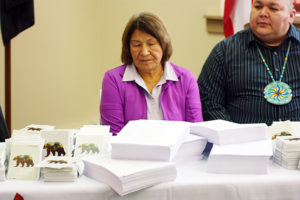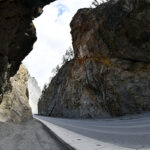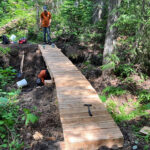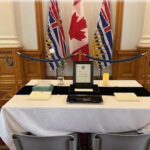Home »

Ktunaxa Nation disappointed with Qat’muk decision
The Supreme Court of Canada this morning unanimously ruled against the Ktunaxa Nation in its ongoing bid to save the Jumbo Valley (Qat’muk) from development for spiritual reasons.
In what’s being call a “landmark” ruling the court stated the constitutional guarantee of aboriginal rights does not provide indigenous people the right of veto over land development in the name of religious freedom.
The Ktunaxa have argued that the creation of the four-season Jumbo Glacier Resort, 55 km west of Invermere, now more than 26 years in process, would cause the Grizzly Bear Spirit to leave, thereby significantly impacting their ability to practice their faith.
The Ktunaxa Nation Council stated in a media release it is profoundly disappointed with today’s Supreme Court decision that found spiritual practices dependent for their meaning on sacred sites are not protected by either the Charter of Rights and Freedoms or the Constitution.

“With this decision, the Supreme Court of Canada is telling every indigenous person in Canada that your culture, history and spirituality, all deeply linked to the land, are not worthy of legal protection from the constant threat of destruction,” said Kathryn Teneese, Ktunaxa Nation Council Chair. “This judgment should be alarming to Canadians, whether or not they consider themselves religious or spiritual. We brought forward our most private and sacred beliefs in the hopes the court would earnestly, and in good faith not just listen, but hear them. The majority’s decision shows clearly that the Ktunaxa people were alone in their efforts to meet the Court halfway. It shows a profound failure for the court to see the Ktunaxa people at all, let alone as people whose values and beliefs deserve respect and protection under the Charter of Rights and Freedoms.”
The case of ‘Ktunaxa Nation Council and Kathryn Teneese, on their own behalf and on behalf of all citizens of the Ktunaxa Nation v. Minister of Forests, Lands and Natural Resource Operations, et al,’ was heard before the Supreme Court of Canada in Ottawa on December 1, 2016. The case stems from the Ktunaxa Nation’s 25-year opposition to the construction of the Jumbo Glacier Resort in the heart of Qat’muk in Ktunaxa territory.
“Reconciliation is more than words, it is actions. The actions of the Supreme Court of Canada today are in direct contradiction of the ideals of reconciliation and Article 25 of the United Nations Declaration on the Rights of Indigenous Peoples,” continued Teneese. “Both the majority and the dissenting judgments send a clear message about where Aboriginal people fit, or do not fit, within Canada. Once again, the worth and value of Indigenous peoples is subjugated to the goals of a Canadian state that seems content to continue without them.
“Despite my disappointment with this decision, I acknowledge and appreciate the overwhelming support we have received from people and organizations across British Columbia, Canada and the world over the course of this lengthy fight.”
There were 17 intervenors at the Supreme Court of Canada hearing, of which 14 were broadly supportive of the Ktunaxa Nation’s position, including the Attorney General of Canada, Amnesty International, the B.C. Civil Liberties Association and a diverse array of indigenous and religious organizations.
“The case we brought before the Supreme Court of Canada was unique,” continued Teneese. “There was no precedent for this type of appeal and while we knew the risks, we were willing to take that chance. Through this decision, the Ktunaxa Nation has opened the door towards legal protection of sacred places and the recognition that the original peoples of Canada have spiritual beliefs and practices as deserving of protection as those of other Canadians. Regardless of the division on the court on these issues, this was a conversation that needed to happen in Canada and the Ktunaxa Nation is proud to be leader in this critical chapter of Canada’s history.
 “We take some comfort in the dissenting views of Justices Moldaver and Cote wherein they recognize that, “If the Ktunaxa’s religious beliefs in Grizzly Bear Spirit become entirely devoid of religious significance, their prayers, ceremonies, and rituals in recognition of Grizzly Bear Spirit would become nothing more than empty words and hollow gestures.”
“We take some comfort in the dissenting views of Justices Moldaver and Cote wherein they recognize that, “If the Ktunaxa’s religious beliefs in Grizzly Bear Spirit become entirely devoid of religious significance, their prayers, ceremonies, and rituals in recognition of Grizzly Bear Spirit would become nothing more than empty words and hollow gestures.”
“This stage of our journey may be over, but our work has only just begun,” continued Teneese. “We will never waver in our duty and obligation to protect Qat’muk. The government of Canada in their argument to the Supreme Court on this matter recognized that Section 2(a) can ‘ protect Indigenous individuals’ and communities’ freedom to hold spiritual and cultural beliefs and engage in practices that involve a relationship with land they consider sacred.’”
“We call on Canada and B.C. to work with us, in the spirit of reconciliation and the commitments of both governments to the UN Declaration on the Rights of Indigenous Peoples, to find alternative solutions to protect Ktunaxa spiritual, cultural and stewardship values within Qat’muk,” continued Teneese.
Ktunaxa Nation lawyer Peter Grant told a post decision news conference, “the Ktunaxa didn’t fail. Our legal system failed at the highest level. Seven judges said they could practice their faith with no meaning; no meaning, think about that.”
Grant said he believes the Supreme Court justices were fearful of making such a landmark decision, tying aboriginal spirituality to the landbase.
“One could say they had blinders on; they don’t want to go there. I think the court was afraid of where that could go. The province raised that fear; don’t do this it will end things. It’s a very sad day. The Crown has ignored their rights.
Robert Phillips, a member of the First Nations Summit and First Nation Leadership Council said the Ktunaxa Nation should be “commended for the struggle.”
Changes in laws and policies are needed in Canada to reflect indigenous ways, he said, noting a First Nations person should be included on the Supreme Court.
“It’s colonial,” Phillips said of the ruling, adding, the Supreme Court decision referenced the UN Declaration on the Rights of Indigenous Peoples “zero times” in its decision.
For the Ktunaxa, Qat’muk’s importance for Grizzly Bear Spirit is inextricably interlinked with its importance for living grizzly bears, now and in the future. Grizzly Bear Spirit is a unique and indispensable source of collective as well as individual guidance, strength, and protection.
For more information on Qat’muk, or to read the Qat’muk Declaration, please visit www.qatmuk.com.
Ian Cobb/e-KNOW







